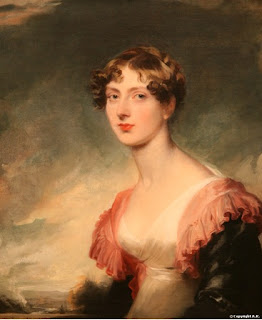But anyway, I digress. Before the concert, we stopped by the Legion of Honor to see the Dutch and Flemish masterworks exhibition currently on display there (quite lovely and worth the trip if you live close enough to go!). After spending some time in there, we explored the rest of the museum and Kathey (who has been to the LOH numerous times before) brought me to what she fondly calls the "Pride and Prejudice" room. Hung entirely in European (mostly British) portraiture from the eighteenth and early nineteenth centuries, this one particular gallery contains within it faces which look curiously familiar. Bringing me from one portrait to the next, Kathey would say, "And who's this?" and somehow my answer was always consistent with hers. It was such fun that I thought I'd share our little adventure in character-finding with you. See if you can't identify which fictional characters from Pride and Prejudice we found so eerily reflected in these well-known portraits of real people from the past!
First we encountered this gentleman:
Sir Duncan Campbell, Bart., by Henry Raeburn (1812).
Look familiar? What about this chap, who we discovered peering at us from the opposite side of the doorway?
Alexander Carre of Cavers, by Henry Raeburn (1802).
Hung directly to his right (rather condescending of him, don't you think?) was this dashing gentleman who I am sure you must know by sight:
Sir William Napier, Bart., by Henry Raeburn (1811-21).
Imposingly displayed in another corner was this lady, painted in her youth, of course, and oh-so-appropriately by none other than Sir Joshua Reynolds:
Anne, Viscountess Townshend, by Sir Joshua Reynolds (1779-80).
And opposite her, we espied this fine looking pair (it looks like they've risen quite nicely in the world, doesn't it?):
Mary, Countess of Plymouth, by Thomas Lawrence (1817).
Other Archer, Earl of Plymouth, by Thomas Lawrence (1817).
Incidentally, Jane Austen herself also enjoyed the pastime of searching out the faces of her fictional characters in the real-life portraits of her contemporaries. In a letter to her sister Cassandra on 24 May 1813, she wrote:
"Henry and I went to the exhibition in Spring Gardens. It is not thought a good collection, but I was very well pleased, particularly (pray tell Fanny) with a small portrait of Mrs. Bingley, excessively like her.
I went in hopes of seeing one of her sister, but there was no Mrs. Darcy. Perhaps, however, I may find her in the great exhibition, which we shall go to if we have time. I have no chance of her in the collection of Sir Joshua Reynolds's paintings, which is now showing in Pall Mall, and which we are also to visit.
Mrs. Bingley's is exactly herself -- size, shaped face, features, and sweetness; there never was a greater likeness. She is dressed in a white gown, with green ornaments, which convinces me of what I had always supposed, that green was a favourite colour with her. I dare say Mrs. D. will be in yellow."The actual portrait Austen singled out as very like "Mrs Bingley" in green ornaments has been identified as "Portrait of Mrs Q (Mrs Harriet Quentin)," by William Blake. Although our Mrs Bingley isn't sporting green, we felt pretty confident that she was quite fond of pink as well, and that Mr Bingley certainly loved her enough to commission two portraits, at the very least. :-)
Jane Austen's Letters, p. 212
Portrait of Mrs Q, by William Blake (1820).








Here are my guesses...in picture order:
ReplyDeleteMr. Wickham
Sir William Lucas(Second guess, Mr. Collins)
Mr. Darcy
Lady Catherine de Bourgh
Mrs. Bingley
Mr. Bingley
Fun game! I do this too...
I think portrait #2 looks like Michael Gambon (Squire Hamley in "Wives & Daughters" or Mr. Holbrook of "Cranford").
ReplyDeleteMy daughter and I say:
ReplyDelete1-Col Fitzwilliam
2-Mr. Wickham
3-Mr. Bingley
4-Lady Catherine De Bourgh
5-Elizabeth Bennet
6-Mr.Darcy
Laurie (BTW we didn't look at what the others wrote.)
This comment has been removed by the author.
ReplyDelete